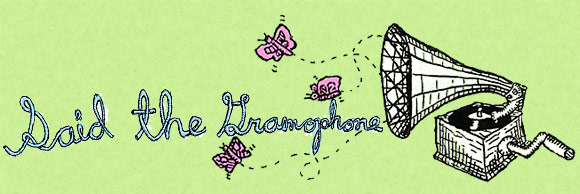John K Samson is a musician, poet, publisher, and one of the finest songwriters in Canada. His band, The Weakerthans, make some of the most fierce and caring rock music I've ever had the fortune to hear: charges of guitar, batteries of drums, lines of longing that shine, shine, shine.
In Edinburgh I've of course talked with people about Canadian music but the band that most seems to fire peoples' eyes is The Weakerthans. The punks and poets both, and of course the millions of us who fall in between.
Listen to mp3s of some of their songs here and here, and buy CDs through those links as well. (I guarantee you will not be disappointed.)
This piece was intended to be published several weeks from now, but of course last week came the news of the death of William Styron, and although it was written before his passing it seemed necessary (for reasons that will become clear) to put this online as soon as possible.
I was more than excited - I was blushing - when John agreed to write something for Said the Gramophone. The result far exceeds what I might even have hoped. Please tell him so - and take care. --Sean
Open Your Clouded Gaze
Two women in Winnipeg killed themselves on the same weekend last month. What pushed this terrible coincidence into the local newspapers was the fact that one of the women was the founder of a support group for family members affected by suicide, and the other had dedicated her working life to helping teenaged girls with eating disorders. Predictably, there was little to be said — no explanations or insights. I don’t have any either. All I could think about was the fact that the few people I have known who have killed themselves have done so at this time of year. In the fall. That isn’t an insight, just a sad piece of trivia.
The novelist William Styron wrote a great short book about his own depression called Darkness Visible — A Memoir of Madness, outlining his preparations for suicide, eventual hospitalization, and recovery. Speaking of the strange lack of an appropriate vernacular for communicating depression he says, "To most who have experienced it, the horror of depression is so overwhelming as to be quite beyond expression, hence the frustrated sense of inadequacy found in the work of even the greatest artists."
Many of those great artists have been musicians. There was no single event that led Styron away from suicide towards recovery, but he does mention one moment that brought him back from the brink of killing himself. He tells of being alone late at night after trying to compose his suicide note, and forcing himself to watch a movie.
"...the characters moved down the hallway of a music conservatory, beyond the walls of which, from unseen musicians, came a contralto voice, a sudden soaring passage from the Brahms Alto Rhapsody. This sound, which like all music — indeed like all pleasure — I had been numbly unresponsive to for months, pierced my heart like a dagger, and in a flood of swift recollection I thought of all the joys the house had known: the children who had rushed through its rooms, the festivals, the love and work, the honestly earned slumber, the voices and the nimble commotion, the perennial tribe of cats and dogs and birds — all this I realized was more than I could ever abandon ... And just as powerfully I realized I could not commit this desecration on myself. I drew upon some last gleam of sanity to perceive the terrifying dimensions of the moral predicament I had fallen into. I woke up my wife and soon telephone calls were made. The next day I was admitted to the hospital."A few bars of music somehow dove through depression, "the gray drizzle of horror," as Styron calls it, and led him away from danger. I decided the Alto Rhapsody would be my soundtrack for this suicide season.
Johannes Brahms - "Alto Rhapsody (Op. 53)", by the Berliner Philharmoniker con. Claudio Abbado, with Marjana Lipovsek. [buy]
The piece starts in a minor key, moody, apprehensive, and trying to my ears, which are fairly unaccustomed to classical music. Then, around seven and a half minutes in, it starts stepping over to the major, and the remaining five and a half minutes are astoundingly beautiful. I can find little in language to accurately explain or describe it. Brahms, it seems, felt the same way. According to Barry Creasy, Chairman, Collegium Musicum of London, Brahms wrote the Alto Rhapsody in 1869 as a wedding present for Julie Schumann, who was marrying an Italian count instead of marrying Brahms. When he played it for Julie’s mother Clara (Robert Schumann’s wife, who Brahms had also been in love with, long story), she wrote in her diary,
"Johannes brought me a wonderful piece... he called it his bridal song... This piece seems to me neither more nor less than the expression of his own heart’s anguish. If only he would for once speak as tenderly!”The lyrics are in German, a poem by Goethe called Winter Journey through the Harz Mountains, and I began to wonder if it could possibly compare to the music itself. I was astonished and contrite when I found this translation:
But who is that apart?Goethe, tenderly, clearly, spells out depression and pleads for its defeat. And the music Brahms set these words to - when he wrote it to ease his own pain, then more than 100 years later through the speakers of William Styron’s television, and perhaps now as you listen on a computer somewhere - actually embodies the poem. It becomes the "one note to his ear audible," to "refresh his heart." Goethe to Brahms to Styron to You. Each link a little closer to expressing the inexpressible.
In the underbrush his path loses itself.
Behind him
The shrubs clap together,
The grass stands up again,
The wasteland engulfs him.
Ah, who heals the pains
Of him, for whom balsam became poison?
Who drank hatred of Man
Out of the fullness of love?
First despised, now a despiser,
He furtively consumes
His own merit
In unsatisfying egotism.If there is in Thy Psalter,
Father of love, one note
To his ear audible,
Then refresh his heart!
Open his clouded gaze
To the thousand springs
Next to the thirsting one
In the desert!
Elliott Smith - "I Didn't Understand" [buy]
The Handsome Family - "Lake Geneva" [buy]
[John K Samson is the lead singer of The Weakerthans and a founding member of Arbeiter Ring Publishing. The next Weakerthans album, tentatively titled Civil Twilight, will be recorded sometime in 2007. Unless it isn't.]
(Previous guest-blogs: Parenthetical Girls, artist Daria Tessler, Clem Snide, Marcello Carlin, Beirut, Jonathan Lethem, Will Butler (Arcade Fire), Al Kratina, Eugene Mirman, artist Dave Bailey, Agent Simple, artist Keith Andrew Shore, Owen Ashworth (Casiotone for the Painfully Alone), artist Kit Malo with Alden Penner (The Unicorns) 1 2, artist Rachell Sumpter, artist Katy Horan 1 2, David Barclay (The Diskettes), artist Drew Heffron, Carl Wilson, artist Tim Moore, Michael Nau (Page France), Devin Davis, Will Sheff (Okkervil River), Edward Droste (Grizzly Bear), Hello Saferide, Damon Krukowski (Damon & Naomi), Brian Michael Roff, Howard Bilerman (producer: Silver Mt. Zion, Arcade Fire, etc.). There are many more to come.)
this is wonderful. thank you.
Posted by Brian Michael Roff at November 10, 2006 10:21 AMJust when you think the StG guest-posts can't get any better...
What great words.
I've been feeling depressed this time of year. Thankfully the University I'm at takes steps to help people though this time. They know the statistics. Thank you for doing this post. It was very moving. As a poet who suffers from depression...there's this detachment I feel between myself and the world. I feel like all I will be writing about is this feeling of detachment, if I do write while depressed. Thank you again for all the lovely music. It really is a joy to come here and find such wonderful gifts of poetry, music, and insight.
Posted by jessant at November 10, 2006 10:40 AMWhat an insightful and interesting post.
Posted by timothy at November 10, 2006 10:41 AMWonderful and lovely and important.
A week ago in Chicago, Malachi Ritscher, a fixture on our local jazz scene, immolated himself on a busy city street. The note he left talked about the act being a protest against the war. I don't know... any attempt to articulate reasons for these things seems inadequate.
Darkness Visible was/is/will be one those crucial books in my life and for a number of people I know. Styron's death was a blow, but at least it was by natural causes.
Posted by Amy at November 10, 2006 11:20 AMAmazing, beautiful post. Thank you.
Posted by Chad at November 10, 2006 12:03 PMBeautiful posting. Thank you!
Posted by Brian at November 10, 2006 12:48 PMParticularly poignant and eerily timely.
Posted by Kyle at November 10, 2006 2:41 PMI remember spending months trying to find expression for the whole thing, but I never came across Styron. I assembled a good collection of what came closest for me, as well as trying myself:
Kierkegaard, Nietzsche (he called it 'Russian Fatalism') Plath (she called it The Bell Jar) Camus (Sisyphus), Nabokov and Dorothy Parker among others. Music expression of it was even scarcer, the Manics' Holy Bible came closer than all else, though Elliot Smith's King's Crossing is tough. I recommend the Irish film 'On The Edge' (2001).
I've tried to write something when I heard of Mr. Styron's death. Because "Face aux ténébres - chronique d'une folie" (that's the translation in French) has been and still is a very important book for me.
Unfortunately, I am not as gifted as the wonderful John K Samson. Mr Samson, I am very pleased to meet you, and I hope your music sounds as good as your words.
Posted by garrincha at November 13, 2006 5:02 AMJohn, this is easily among my favorite StG posts. Thank you, sincerely.
Also, I had the good fortune to see your band a few years ago, at the Knitting Factory in New York. I remember two things distinctly: big, big smiles, and an unusual abundance of pretty women in attendence.
Posted by Tyler at November 15, 2006 4:31 PMUmmm I really liked this post and wrote this:
Darkness Visible [again]
Your depression carved into
my flesh like an epic poem,
only not Italian this time. Dante
never thought outside those circles,
or questioned a lost revolution with
the Poignancy of Satan's last
first breath, enjambing my
tears, my hollow tears; oh, if tears
would even now ache for the
complexity of a feeling trapped
in a melody. I've listened to
Brahms every day since I got
off the drugs, and there is no
priest to hear my sob-story now,
no miniskirt to lust after
sinfully, and no lake of fire
like the other post-industrial
upstate city, the one I was
raised in, the one that taught
me that in golf a man keeps
his own score--(but at 17 I
cheated)--and a stones throw
from the fourth green my sorrow
sleeps like a stubborn refusal
to rhyme, or a metrical crutch.
for William Styron
...
and John Milton.
you can find it here: http://the-aesthete.blogspot.com/2006/11/darkness-visible-again.html
Posted by jeff at November 29, 2006 3:13 AM



